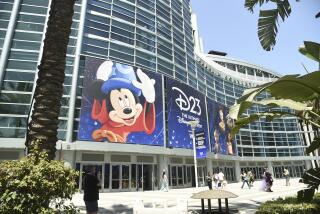Disney California Adventure: How we got here and whatâs next
After more than a decade in existence and $1.1 billion in renovations, Disney California Adventure still probably needs another billion dollars in improvements before it can be worthy of the Disney name.
RELATED: Disney park braces for âcarmageddonâ as Cars Land opens
As the hoopla surrounding the grand reopening of the Anaheim theme park dies down, I thought it would be a good time to take a look back at what DCA was, has become and could be.
REVIEWS: Cars Land | Radiator Springs Racers | Materâs Junkyard Jamboree | Luigiâs Flying Tires |Buena Vista Street
The story of DCA actually starts way back in 1991 when Disney announced plans to build the $3-billion Westcot in the old Disneyland parking lot. For myriad reasons, the West Coast version of Disney Worldâs Epcot was eventually canceled and new plans were unveiled for an edgy and hip 55-acre theme park celebrating California pop culture.
PHOTOS: Buena Vista Street | Cars Land | Radiator Springs Racers | Materâs Junkyard Jamboree | Luigiâs Flying Tires | Cars Land origins
Located a football field away from Disneyland, the $1.1-billion Disney California Adventure opened in 2001 to dismal reviews and low attendance thanks to an absence of Disney characters, on-the-cheap carnival rides and bad word of mouth from early visitors who complained about the laughable theme, bad puns and lack of childrenâs attractions.
By the end of the first year, high-profile, high-end restaurants by Wolfgang Puck and Robert Mondavi pulled out of the park, operating schedules were scaled way back and Disney officials scrambled to come up with a way to put lipstick on a pig.
The problems were endless and all self-inflicted. The nighttime âLuminariaâ pyrotechnic water show spewed a constant and heavy plume of smoke on the crowds lining a man-made lagoon. The poorly conceived and ill-received Eureka parade featured stilt-walking Chinese food takeout boxes perched on chopstick legs. And among the meager 23 attractions on the park map were a bread-baking demonstration and a tortilla-making exhibit.
The Paradise Pier area of the park was the worst offender, leading some to dubiously dub the park âSix Flags California Adventure.â The land with the seaside amusement park theme included a wave swing inside a giant unpeeling orange, a sunglass shop inside a towering dinosaur and a McDonalds restaurant inside a hamburger-shaped spaceship.
DCA was a stinker and everybody knew it -- except Disney, which threw good money after bad at the park. The addition of a bugâs land kiddie area, Tower of Terror drop ride and Monsters Inc. dark ride failed to significantly goose interest, improve attendance or fix the parkâs faulty conceit.
Finally in 2007, Disney admitted defeat and conceded the obvious: DCA was broken and in serious need of repair to the tune of $1.1 billion. Over the next five years the company dutifully set about correcting the mistake.
Stripping off the pun-filled pop culture veneer, the reimagined park would offer a more historic take on California with a back story that focused on Walt Disneyâs 1923 arrival in Los Angeles.
During the five-year renovation, Disney California Adventure re-themed several attractions (Silly Symphony Swings and Goofyâs Sky School) and added a pair of classic dark rides (Toy Story Midway Mania and Little Mermaid: Arielâs Undersea Adventure), wildly popular nighttime entertainment (âWorld of Colorâ and ElecTRONica) and two new lands (Cars Land and Buena Vista Street).
RELATED: Looking into the crystal ball at DCAâs future
Which brings us up to today and what lies ahead for DCA.
With about 35 rides and shows, Disney California Adventure still only has about half as many attractions as Disneyland.
Of the parkâs eight themed lands, itâs a fairly safe bet that Disney wonât be making many changes to Cars Land, Buena Vista Street or Paradise Pier anytime soon now that the $1.1-billion renovation is complete. That leaves five lands and about two-thirds of DCA still in need of attention from Walt Disney Imagineering, the creative arm of the company that has crafted a comprehensive vision for the entire park going forward.
If Westcot was set to cost $3 billion and Disney spent $1 billion on its first attempt at DCA and another $1 billion on the renovation, it stands to reason it will take yet another $1 billion to get the park up to the companyâs gold standard. I suspect the next phase of upgrades to DCA will be announced in more typical but robust $100 million to $200 million annual increments rather than in a single billion dollar chunk.
The next logical area to attack is the newly dubbed Hollywood Land, which has a pair of studio soundstages sitting empty that once housed the âWho Wants to Be a Millionaireâ show and the Hollywood & Dine food court. Any makeover would remove the still-remaining pop cultural signage in the land and affix a distinct 1930s to 1940s golden age of Hollywood time period to the area. And then thereâs the question of what to do with the last remaining five acres of the former Timon parking lot sitting behind Tower of Terror.
After that, Imagineering will have to figure out how to tackle the neighboring Grizzly Peak and Condor Flats lands, which both suffer from the same problem: a severe dearth of attractions. Grizzly River Run, lacking both Disney DNA and audio-animatronics, takes up a precious five acres of land and serves as a constant reminder of the old park, making the rapids ride and its iconic peak a prime target for renovation or removal. Meanwhile, speculation has circulated for years that Soarinâ Over California could get an internationally-themed movie upgrade while Redwood Creek Challenge Trail might be leveled in favor of a new E-Ticket ride.
Like a doughnut hole in the middle of the park, the Pacific Wharf food court, the unused San Francisco city block and under-utilized Golden Vine Winery seem orphaned from any land, time period or storyline. Short of few name changes, all three areas remain essentially unchanged since DCA opened in 2001. The entire space cries out for a Buena Vista Street-style reimagineering.
That leaves a bugâs land, a 2002 Band-Aid intended as a quick fix to the persistent complaint that DCA lacked any attractions for young children. What visitors got and what weâre still left with is the most pathetic collection of kiddie rides ever assembled in a Disney park: the bumper cars donât bump, the teacup ride ends before it gets going and the caterpillar train feels like the beginning of a dark ride that doesnât exist. And then thereâs the absolute lack of a connection to DCAâs California theme. But like any set of off-the-shelf carnival rides, bugâs land can and should be folded up overnight and shipped to the next county fair or church picnic where it belongs.
It may take another five years of consistent investment to undo the bad will DCA has built up over the past decade, but if the turnstiles spin and the cash registers ring the money should be there to continue the parkâs considerable uphill climb. If and only if that happens, DCA could still turn out to be a worthy neighbor to Disneyland despite the rough start.
More to Read
Sign up for The Wild
Weâll help you find the best places to hike, bike and run, as well as the perfect silent spots for meditation and yoga.
You may occasionally receive promotional content from the Los Angeles Times.







